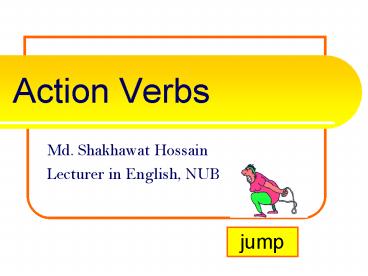Action Verbs PowerPoint PPT Presentation
1 / 17
Title: Action Verbs
1
Action Verbs
- Md. Shakhawat Hossain
- Lecturer in English, NUB
jump
2
What is an action verb?
- A verb is one of the most important parts of the
sentence. It tells the subjects actions, events,
or state of being. It is always found in the
predicate of a sentence. A verb that shows
action is called an action verb.
3
The words are action verbs
ran
coughed
swallowed
ride
sang
awake
4
Can you find the action verb in each sentence?
- The girls danced in the recital.
- Our mailman drove a funny car last week.
- His teacher wrote the answers on the board.
- Alice worked on her homework last night.
Move On
5
No, try again.
6
Yes, that word is an action verb!
Try another sentence
Move On
7
Present verbs
- An action verb that describes an action that is
happening now is called a present tense verb.
The bird flies through the sky.
Flies is a present tense verb because it is
happening right now.
8
Present tense verbs
- Many present tense verbs end with s, but some end
with es, or ies.
cries
sleeps
splashes
9
Past Verbs
- Verbs which tell about actions which happened
some time ago are past tense verbs.
The dog wanted a bone.
Wanted is a past tense verb because the action
has already happened.
10
Past tense verbs
- Many past tense verbs end with ed, but some end
with d, or ied.
tried
clapped
played
11
Future Verbs
- Verbs which tell about actions which are going to
happen are future tense verbs.
We will awaken at six a.m.
Will awaken is a future tense verb because the
action has not yet happened.
12
Future tense verbs
- Future tense verbs use special words to talk
about things that will happen will, going to,
shall, aim to, etc.
going to start
will enjoy
shall email
13
Helping Verbs
- A helping verb works with a main verb to help you
understand what action is taking place.
Elmer was using the computer.
14
23 Helping Verbs
maymightmust bebeingbeenamareiswaswere (main) dodoesdid (main) shouldcouldwould havehadhas (main) willcanshall
15
Helping Verbs
- Other things to keep in mind
- Not every sentence will have a helping verb with
the main verb. - When you see an "ing" verb such as "running", be
on the lookout for a helping verb also.
16
Helping Verbs
- Sometimes there is another word which separates
the helping verb from the main verb. One common
example is "not", as in The boy couldn't find
his socks. The helping verb is could and the main
verb is find.
17
Helping Verbs
- A sentence may contain up to three helping verbs
to the main verb. An example would be The dog
must have been chasing the cat. The helping verbs
are must, have, and been the main verb is
chasing.

